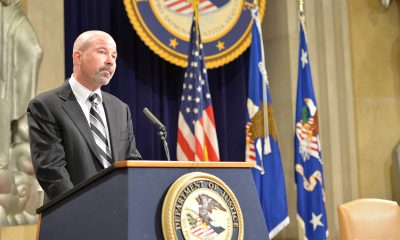National
Gay adoption ban ends in Florida
State attorney general won’t appeal ruling striking down ban

Florida Attorney General Bill McCollum announced Friday that he won’t appeal a court ruling last month overturning Florida’s law banning gay people from adopting children, putting a “final end” to the 33-year old prohibition, according to gay rights attorneys.
The decision by a state appellate court striking down the adoption ban law arose from an emotional case in which Martin Gill, a gay man, sought to adopt two children that he and his domestic partner have been raising for almost six years as foster parents.
“This law, by baselessly branding gay people unfit parents, was one of the most notoriously anti-gay laws in the country, and we are delighted that it has been ended once and for all,” said Leslie Cooper, senior staff attorney with the ACLU’s LGBT Project.
Cooper argued the case on behalf of the ACLU before Florida’s Third District Court of Appeals, which handed down the decision overturning the law in September.
“This victory means that the thousands of children in Florida who are waiting to be adopted will no longer be needlessly deprived of willing and able parents who can give them the love and support of a family,” Cooper said in a statement.
Florida Gov. Charlie Crist, who is running in a hotly contested race for the U.S. Senate as an independent, and the Florida Department of Children and Families, announced shortly after the appellate court ruling that they would not appeal the decision.
Crist changed his party affiliation from Republican to independent earlier this year after conservative Republican Marco Rubio defeated him in the Republican primary. Rubio’s position on the decision not to appeal the adoption ban decision could not be immediately determined.
The action by the appellate court upholds a November 2008 decision by a Miami-Date County Circuit Court judge, who ruled that the law barring adoption by gay people is unconstitutional. Judge Cindy Lederman granted Gill’s petition to adopt his two foster sons, who are now six and ten years old.
The decision followed a four-day trial in which experts testifying on Gill’s behalf cited research showing that no difference can be found in the wellbeing of children raised by either gay or straight parents.
In its ruling last month, the Third District Court of Appeals agreed with that view, stating, “The issue is so far beyond dispute that it would be irrational to hold otherwise; the best interests of children are not preserved by prohibiting homosexual adoption.”
In his statement announcing he would not appeal the case, McCollum suggested the final outcome on the issue may not have been reached.
“The constitutionality of the Florida law banning adoption by homosexuals is a divisive matter of great public interest,” he said. “As such, the final determination should rest with the Florida Supreme Court, not a lower appellate court. But after reviewing the merits of independently seeking Supreme Court review, following the decision of our client the Department of Children and Families not to appeal the decision of the Third District Court of Appeal, it is clear that this is not the right case to take to the Supreme Court for determination,” he said.
But he added, “No doubt someday a more suitable case will give the Supreme Court the opportunity to uphold the constitutionality of this law.”
ACLU staff attorney Shelbi Day, who also represented Gill in the case, said it would be highly unlikely that another case would arise to change the ruling of the appellate court, which is binding on all lower courts throughout the state and effectively kills the adoption ban law.
Gill said through a statement that he and his partner are relieved that their long ordeal to secure the adoption of two children they have cared for more than six years has finally come to a close.
“Our boys have overcome difficult beginnings to become happy, healthy kids,” he said. “All children deserve a chance at finding a stable, loving and permanent home. Over the 33 years of the ban, this archaic law has harmed countless foster children by denying them a forever family.”
U.S. Supreme Court
Supreme Court to consider bans on trans athletes in school sports
27 states have passed laws limiting participation in athletics programs

The U.S. Supreme Court on Thursday agreed to hear two cases involving transgender youth challenging bans prohibiting them from participating in school sports.
In Little v. Hecox, plaintiffs represented by the ACLU, Legal Voice, and the law firm Cooley are challenging Idaho’s 2020 ban, which requires sex testing to adjudicate questions of an athlete’s eligibility.
The 9th U.S. Circuit Court of Appeals described the process in a 2023 decision halting the policy’s enforcement pending an outcome in the litigation. The “sex dispute verification process, whereby any individual can ‘dispute’ the sex of any female student athlete in the state of Idaho,” the court wrote, would “require her to undergo intrusive medical procedures to verify her sex, including gynecological exams.”
In West Virginia v. B.P.J., Lambda Legal, the ACLU, the ACLU of West Virginia, and Cooley are representing a trans middle school student challenging the Mountain State’s 2021 ban on trans athletes.
The plaintiff was participating in cross country when the law was passed, taking puberty blockers that would have significantly reduced the chances that she could have a physiological advantage over cisgender peers.
“Like any other educational program, school athletic programs should be accessible for everyone regardless of their sex or transgender status,” said Joshua Block, senior counsel for the ACLU’s LGBTQ and HIV Project. “Trans kids play sports for the same reasons their peers do — to learn perseverance, dedication, teamwork, and to simply have fun with their friends,” Block said.
He added, “Categorically excluding kids from school sports just because they are transgender will only make our schools less safe and more hurtful places for all youth. We believe the lower courts were right to block these discriminatory laws, and we will continue to defend the freedom of all kids to play.”
“Our client just wants to play sports with her friends and peers,” said Lambda Legal Senior Counsel Tara Borelli. “Everyone understands the value of participating in team athletics, for fitness, leadership, socialization, and myriad other benefits.”
Borelli continued, “The U.S. Court of Appeals for the Fourth Circuit last April issued a thoughtful and thorough ruling allowing B.P.J. to continue participating in track events. That well-reasoned decision should stand the test of time, and we stand ready to defend it.”
Shortly after taking control of both legislative chambers, Republican members of Congress tried — unsuccessfully — to pass a national ban like those now enforced in 27 states since 2020.
Federal Government
UPenn erases Lia Thomas’s records as part of settlement with White House
University agreed to ban trans women from women’s sports teams

In a settlement with the Trump-Vance administration announced on Tuesday, the University of Pennsylvania will ban transgender athletes from competing and erase swimming records set by transgender former student Lia Thomas.
The U.S. Department of Education’s Office for Civil Rights found the university in violation of Title IX, the federal rights law barring sex based discrimination in educational institutions, by “permitting males to compete in women’s intercollegiate athletics and to occupy women-only intimate facilities.”
The statement issued by University of Pennsylvania President J. Larry Jameson highlighted how the law’s interpretation was changed substantially under President Donald Trump’s second term.
“The Department of Education OCR investigated the participation of one transgender athlete on the women’s swimming team three years ago, during the 2021-2022 swim season,” he wrote. “At that time, Penn was in compliance with NCAA eligibility rules and Title IX as then interpreted.”
Jameson continued, “Penn has always followed — and continues to follow — Title IX and the applicable policy of the NCAA regarding transgender athletes. NCAA eligibility rules changed in February 2025 with Executive Orders 14168 and 14201 and Penn will continue to adhere to these new rules.”
Writing that “we acknowledge that some student-athletes were disadvantaged by these rules” in place while Thomas was allowed to compete, the university president added, “We recognize this and will apologize to those who experienced a competitive disadvantage or experienced anxiety because of the policies in effect at the time.”
“Today’s resolution agreement with UPenn is yet another example of the Trump effect in action,” Education Secretary Linda McMahon said in a statement. “Thanks to the leadership of President Trump, UPenn has agreed both to apologize for its past Title IX violations and to ensure that women’s sports are protected at the university for future generations of female athletes.”
Under former President Joe Biden, the department’s Office of Civil Rights sought to protect against anti-LGBTQ discrimination in education, bringing investigations and enforcement actions in cases where school officials might, for example, require trans students to use restrooms and facilities consistent with their birth sex or fail to respond to peer harassment over their gender identity.
Much of the legal reasoning behind the Biden-Harris administration’s positions extended from the 2020 U.S. Supreme Court case Bostock v. Clayton County, which found that sex-based discrimination includes that which is based on sexual orientation or gender identity under Title VII rules covering employment practices.
The Trump-Vance administration last week put the state of California on notice that its trans athlete policies were, or once were, in violation of Title IX, which comes amid the ongoing battle with Maine over the same issue.
New York
Two teens shot steps from Stonewall Inn after NYC Pride parade
One of the victims remains in critical condition

On Sunday night, following the annual NYC Pride March, two girls were shot in Sheridan Square, feet away from the historic Stonewall Inn.
According to an NYPD report, the two girls, aged 16 and 17, were shot around 10:15 p.m. as Pride festivities began to wind down. The 16-year-old was struck in the head and, according to police sources, is said to be in critical condition, while the 17-year-old was said to be in stable condition.
The Washington Blade confirmed with the NYPD the details from the police reports and learned no arrests had been made as of noon Monday.
The shooting took place in the Greenwich Village neighborhood of Manhattan, mere feet away from the most famous gay bar in the city — if not the world — the Stonewall Inn. Earlier that day, hundreds of thousands of people marched down Christopher Street to celebrate 55 years of LGBTQ people standing up for their rights.
In June 1969, after police raided the Stonewall Inn, members of the LGBTQ community pushed back, sparking what became known as the Stonewall riots. Over the course of two days, LGBTQ New Yorkers protested the discriminatory policing of queer spaces across the city and mobilized to speak out — and throw bottles if need be — at officers attempting to suppress their existence.
The following year, LGBTQ people returned to the Stonewall Inn and marched through the same streets where queer New Yorkers had been arrested, marking the first “Gay Pride March” in history and declaring that LGBTQ people were not going anywhere.
New York State Assemblywoman Deborah Glick, whose district includes Greenwich Village, took to social media to comment on the shooting.
“After decades of peaceful Pride celebrations — this year gun fire and two people shot near the Stonewall Inn is a reminder that gun violence is everywhere,” the lesbian lawmaker said on X. “Guns are a problem despite the NRA BS.”




















